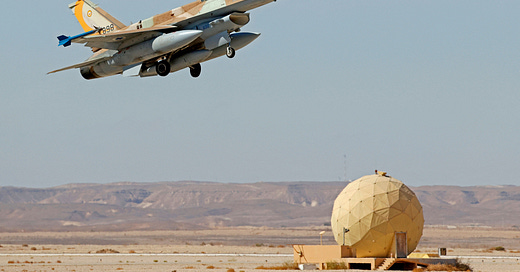
Over the last decades, Israel believed it had largely deterred its enemies from attacking the homeland—until October 7. That day, more than 2,000 Hamas terrorists from Gaza murdered 1,200 Israeli men, women, and children in the most sadistic ways possible.
The barbaric Hamas terrorist attack demonstrated that Israel’s deterrence is at its weakest closest to its borders. And even as it remains intact further afield, Israel’s deterrence could break down if Iran’s isolation on the world stage ends—something decisionmakers in Jerusalem, Washington, and other capitals ought to take seriously. To better ensure its security, Israel must acknowledge where its deterrence has failed and recognize where it must be reinforced.
Danger on Israel’s Doorstep
The October 7 attack reminded Israel that Hamas is a terrorist organization whose ideology and religious motivations ensure it cannot be deterred in the long run. For years, Israel chose to manage the Hamas threat. Its goal was to keep the situation in Gaza at a low simmer and deter Hamas terrorist attacks by providing the group, via Qatar, limited economic support for fuel, salaries of civil servants, and other goods. Israeli policy was predicated on the flawed assumption that Hamas wouldn’t risk overwhelming Israeli retaliation that would threaten Hamas itself and its control of the Gaza Strip. October 7 proved this view catastrophically wrong.
This leaves Israel with a second choice: eliminate the threat. For the international community and many Arab governments, eliminating Hamas comes with the extraordinarily high and, in their view, unacceptable cost of civilian deaths and untold destruction in Gaza. Israel must do everything possible to protect ordinary Palestinians in Gaza, and the Israeli government should agree to humanitarian pauses and the creation of a more permanent humanitarian aid corridor.
Israelis across the political spectrum see eliminating Hamas as unavoidable, even if they recognize that destroying its capabilities and killing its leaders won’t destroy the ideology. It could take years to eliminate the leaders, financers, and others outside Gaza who contributed to October 7. Even without fighting on other fronts, it will likely take months for Israel to complete its ground operations in Gaza. But a ceasefire now would hand Hamas victory, ensuring that Israel lives under permanent threat—and Hamas leaders have publicly promised to carry out more attacks like October 7. No country can be expected to live under such circumstances, and a ceasefire may bring a temporary peace but it will guarantee a larger, even more devastating war in the future.
Even as attention understandably focuses on Gaza, it’s important to keep an eye on the West Bank. The situation there for Palestinians continues to deteriorate, while potential for increased intra-Palestinian violence has been growing for years as varying Palestinian factions arming themselves for the inevitable power struggle that will follow when current Palestinian Authority President Mahmoud Abbas leaves the scene. But those arms can easily be turned and used against Israel instead.
In West Bank cities like Jenin and Nablus, the Palestinian Authority retains formal political authority but lacks practical civil and security control. The Lions Den, a relatively new and largely non-religious militant group headquartered in Nablus responsible an uptick in violence against Israelis in the West Bank last year, is among the most prominent of groups that want to fight Israel. It also views the PA as an illegitimate representative of the Palestinian people. With the majority of the West Bank population under the age of 30 and little real memory of the Second Intifada, it’s increasingly unclear whether Israel can effectively deter militant groups—or even ordinary Palestinians incensed by Israel’s military campaign in Gaza or Israeli settler violence against Palestinians in the West Bank.
To save his own skin, Prime Minister Benjamin Netanyahu handed significant power over Israeli policy in the West Bank to far-right coalition partners like Bezalel Smotrich and Itamar Ben-Gvir. These ministers have promoted and defended extremist settlers no matter their behavior, and settlers themselves have gotten the message loud and clear.
The Threat in the North
Lebanese Hezbollah has built an arsenal the likes of which Israel has never faced from a terrorist group on its border. It possesses an advanced suite of missiles, tens of thousands of shorter-range rockets and suicide drones, and heavily trained fighters battle-tested in combat to preserve the Assad regime in Syria.
Since October 7, Hezbollah has engaged in tit-for-tat strikes with Israel that risks significant escalation. Bitter memories of the 2006 war helped Israel deter Hezbollah, but the terrorist army has kept up its attacks as Israel’s ground campaign in Gaza continues. Hezbollah probably believes that it must undertake these strikes to retain credibility within its own ranks and with its allies; Hezbollah members have been told for years that they are the vanguard of resistance to Israel. These attacks therefore are designed to try to thread an incredibly small needle: demonstrate sufficient support for Hamas against Israel, without escalating the situation into a full-scale war. But in doing so, Hezbollah and Israel are playing a dangerous Middle East version of Russian roulette.
The biggest deterrent to Hezbollah may have nothing to do with Israel. The group’s domestic position in Lebanon is meaningfully worse than in 2006 when Hezbollah was roundly blamed for the war. Today, Lebanon is incapacitated by political disfunction—which is embodied in its caretaker government with limited powers now heading into its second year. The Lebanese pound has lost 98 percent of its value in the last four years, more than 80 percent of the country is in poverty, and the banking system is in shambles.
With such a challenging national economic and political situation, a war of choice by Hezbollah would leave thousands dead and Lebanon physically and psychologically destroyed. Many in Lebanon already view Hezbollah’s effective veto over government policies as driving the country to ruin. Hezbollah is neither stupid nor naïve, however, and launching a full-scale war with Israel would do little to bring it support and could rally much of Lebanon to oppose whatever was left of Hezbollah following a war.
Expecting Hezbollah to remain on the sidelines of the conflict out of concern for its domestic position would nonetheless be an unwise calculation. Hamas and Hezbollah are not the same, nor are Gaza and Lebanon. But ultimately both groups are rooted in ideologies that seek Israel’s destruction—and intimately tied to the ruling regime in Iran.
All Roads Lead to Tehran
Israel can take some solace it and the United States continue to deter Iran, Hamas and Hezbollah’s patron.
The reason American and Israeli deterrence holds in this case is that Tehran’s primary goal is survival. Iran’s willingness to sacrifice its Arab brethren in Iraq, Syria, Lebanon, or the West Bank and Gaza to die for a crusade against the “Zionist entity” stands in sharp contrast to its own unwillingness to assume much if any risk in the conflict. Tehran balances support for its proxies and partners—to whom it provides money, weapons, and training—with an avoidance of direct conflict that would risk retaliation from either the United States and Israel.
Unable to fully rely on its relationships with China or Russia to ensure its survival, Tehran continues to depend, at least partly, on regional power projections through its network of partners and proxies (as well as the potential development of a nuclear weapon). But a decision by Iran and Hezbollah to intervene against Israel could undermine Iran’s deterrence posture and set back Iran’s nuclear weapons program. Hezbollah would deplete much, if not almost all, of its weapons inventory to attack Israel, risking military intervention by Israel and the United States.
For years, among Israel’s greatest worries about striking Iran’s nuclear program has been the possibility of triggering a multi-front war, with Hezbollah and Hamas jumping to Iran’s defense. But in a situation in which both Hezbollah and Hamas arsenals are depleted, Israel might view the months after the conflict as the best window in which to strike the program.
The Future of Israeli Deterrence
Traditionally, Israeli military operations aimed to reduce or eliminate security threats and restore deterrence. Reduction still remains a meaningful goal, but elimination will be harder to achieve. The costs to Iran of Israel decimating Hamas and Hezbollah—while high—still probably would not deter it in the long-term nor compel it to reconsider its efforts to develop a nuclear weapon.
This will be even more true as Iran’s own indigenous weapons capabilities continue to improve and if its relationship with Russia or China becomes closer and more strategic. Indeed, given the level of anti-Semitism and anti-Israel sentiment in Putin’s Russia—as well as Russia’s reliance on Iranian hardware in its war against Ukraine—it’s not difficult to imagine a post-conflict scenario in which Tehran and Moscow forge even closer security ties. Iran could increase its provision of drones and other hardware for Russia’s use in Ukraine, for instance, and Russia could agree to use its anti-aircraft missile defense systems in Syria to limit Israel’s freedom of action against Iran and its proxies there. Beijing, for its part, could offer additional international support to Iran at the UN and in other international for in exchange for discounted oil and Iranian promises of regional restraint.
For now, superior Israeli and allied capabilities offer Israel some measure of protection. But that edge will not hold forever. Ultimately, Israel and its closest partners will need to manage a restive Middle East by other means.
Jonathan Panikoff is the director of the Scowcroft Middle East Security Initiative at the Atlantic Council’s Middle East Program.





